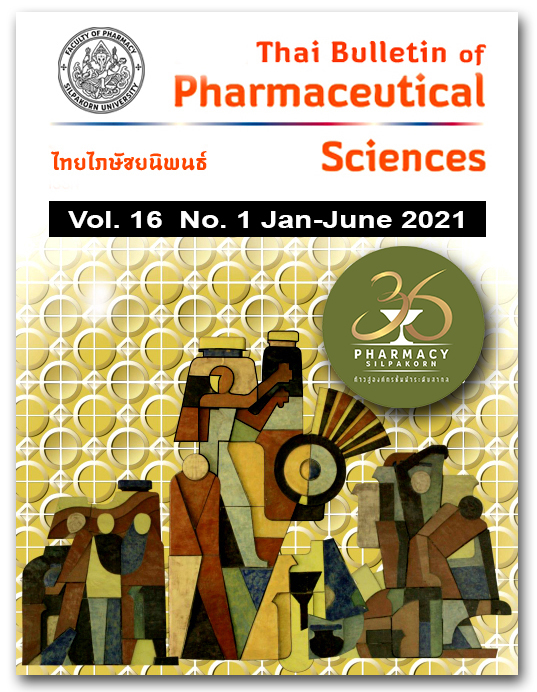EFFECTS OF SELF-REGULATION PROGRAM WITH PEER SUPPORT GROUP THROUGH LINE APPLICATION FOR WEIGHT CONTROL OF HEALTHCARE PROVIDERS
DOI:
https://doi.org/10.69598/tbps.16.1.109-121Keywords:
overweight, obesity, peer support group, self-regulation, LINE applicationAbstract
This study aimed to investigate the effects of self-regulation programs with a peer support group program through LINE application for weight control of healthcare providers. Self-regulation programs can help to change a person's behavior to their desired one. There are three parts of self-regulation including self-observation, a judgment process, and self-reflection. The participants of this study were the staff of Pakchongnana Hospital, Nakhon Ratchasima Province, with a body mass index (BMI) greater than or equal to 23 kg/m2. Thirty-two volunteers of the age 21-57 years old were included in the study, whilst 84.4% were female. The mean weight was 80.80 ± 15.04 kg, and the mean BMI was 30.96 ± 4.73 kg/m2. Subsequent to the peer support group program with self-discipline via LINE application with face-to-face and LINE group activities for 12 weeks, the results revealed that the participants' weight, BMI, and waist circumference were significantly reduced after 12 weeks (p < 0.05) compared with their baselines. In conclusion, the self-regulation program with a peer support group through LINE application is useful in controlling weight by exchanging knowledge and experiences along with group support in the LINE group which guided the participants to self-observations, judgments, and self-reactions on eating and exercise behavior leading to behavioral changes resulting in weight loss.
References
Ekphalakorn W. The survey of the Thai public health by the 5th physical examination. 1st ed. Bangkok: Graphic and Design Publishing House; 2014.
Guh DP, Zhang W, Bansback N, Amarsi Z, Birmingham CL, Anis AH. The incidence of co-morbidities related to obesity and overweight: A systematic review and meta-analysis. BMC Public Health. 2009;9:88.
The GBD 2015 Obesity Collaborator. Health effects of overweight and obesity in 195 countries over 25 years. N Engl J Med. 2017;377:13-27.
Kanchanachitra C. Thai Health 2014: Self-management communities. 1st ed. Nakhon Pathom: Institute for Population and Social Research, Mahidol University; 2014.
Puhl RM, Gold JA, Luedicke J, DePierre JA. The effect of physicians’ body weight on patient attitudes: implications for physician selection, trust and adherence to medical advice. Int J Obes. 2013;37(11):1415-21.
Kyle RG, Wills J, Mahoney C, Hoyle L, Kelly M, Atherton LM. Obesity prevalence among healthcare professionals in England: a cross- sectional study using the Health Survey for England. BMJ open. 2017;7:e018498.
Saiphiroonthong W, Choaksuwankij C, Chaimanee A. The association between sedentary work and obesity among medical personnel in Nopparat rajathanee hospital. PHJBUU. 2015;2:34-43.
Saridi M, Filippopoulou T, Tzitzikos G, Sarafis P, Souliotis K, Karakatsani D. Correlating physical activity and quality of life of healthcare workers . BMC Res Notes. 2019;12:208.
Iamsupasit S. Theories and techniques in behavior modification. 3rd ed. Bangkok: Chulalongkorn University;1998.
Sawetprasart P. Effects of self-regulation program on weight loss behavior and bodyweight among overweight female village health volunteer. J Prapokklao Hosp Clin Med Educat Center. 2019;36(1):47-56.
Kulik N, Ennett ST, Ward DS, Bowling JM, Fisher EB, Tate DF. Brief report: a randomized controlled trial examining peer support and behavioral weight loss treatment. J Adolesc. 2015;44:117-23.
Jamal SN, Moy FM, Mohamed MNA, Mukhtar F. Effectiveness of a group support lifestyle modification (gslim) programme among obese adults in workplace: a randomised controlled trial. PLoS ONE. 2016;11(8):e0160343.
Roadkaew K, Leelukkanaveera Y, Lawang W. The effects of self-regulation with buddy care program on diabetes preventive behaviors, body weight, and blood sugar level among overweight pre-diabetes. J Nurs Educ. 2018;11:13-28.
Lemstra, M, Bird, Y, Nwankwo C, Rogers, M, Moraros, J. Weight loss intervention adherence and factors promoting adherence: a meta-analysis. Patient Prefer Adherence. 2016;10:1547-59.
Maturo A, Setiffi F. The gamification of risk: how health apps foster self-confidence and why this is not enough. Health Risk Soc. 2016;17:477-94.
LINE Thailand [update 2020 Jan 30; cite 2020 June 16] Available from: https://linecorp.com/th/pr/news/th/2020/ 3168
Suthirit S, Pinchaleaw D, Keskomon T. The effectiveness of self regulation program with line application among overweight health volunteers. JOPN. 2018;10:330-39.
Vaayeeta R, Chaosuansreecharoen KR, Chaichana B, Chaosuansreecharoen P. Effectiveness of a health behavior change program on self efficacy, self regulation, self care and weight loss among overweight health personal of Raman hospital, Yala province. NJPH. 2015;24:90-104.
Saikwa B, Boonyatum P, Jaisanit P. Developing ethnic students’ english speaking skills through the use of peer-assisted learning activities. CRRU Grad Sch J. 2017;3:77-86.
PLeangpanich P, Somprasert C, Imkome E. The effects of a peer support group program on psychosocial rehabilitation abilites in caregivers of schizophrenic patients. J Royal Thai Army Nurses. 2018;19:214-23.
Chaichana P, Kitisri C. Effects of a self-efficacy enhancement by using buddy system program on self-care behaviors and hemoglobina1c among patients with diabetes mellitus, type 2. J NAT North. 2019;24(1):100-11.
Jiamjarasrangsi W. Peer support for type 2 diabetes self-management. Chula Med J. 2012;56(6):629–45.
Flores Mateo G, Granado-Font E, Ferré-Grau C, Montaña-Carreras X. Mobile phone apps to promote weight loss and increase physical activity: a systematic review and meta-analysis. J Med Internet Res. 2015;17(11):e253.
Downloads
Published
How to Cite
Issue
Section
License
All articles published and information contained in this journal such as text, graphics, logos and images is copyrighted by and proprietary to the Thai Bulletin of Pharmaceutical Sciences, and may not be reproduced in whole or in part by persons, organizations, or corporations other than the Thai Bulletin of Pharmaceutical Sciences and the authors without prior written permission.



